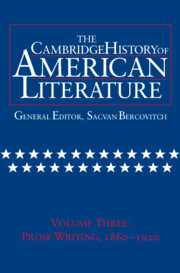Book contents
- Frontmatter
- Introduction
- THE AMERICAN LITERARY FIELD, 1860–1890
- LITERARY FORMS AND MASS CULTURE, 1870–1920
- PROMISES OF AMERICAN LIFE, 1880–1920
- BECOMING MULTICULTURAL: CULTURE, ECONOMY, AND THE NOVEL, 1860–1920
- 1 Introduction
- 2 Remembering civil war
- 3 Social death and the reconstruction of slavery
- 4 Cosmopolitan variations
- 5 Native-American sacrifice in an age of progress
- 6 Marketing culture
- 7 Varieties of work
- 8 Corporate America
- 9 Realist utopias
- Chronology 1860–1920
- Bibliography
- Index
8 - Corporate America
from BECOMING MULTICULTURAL: CULTURE, ECONOMY, AND THE NOVEL, 1860–1920
Published online by Cambridge University Press: 28 March 2008
- Frontmatter
- Introduction
- THE AMERICAN LITERARY FIELD, 1860–1890
- LITERARY FORMS AND MASS CULTURE, 1870–1920
- PROMISES OF AMERICAN LIFE, 1880–1920
- BECOMING MULTICULTURAL: CULTURE, ECONOMY, AND THE NOVEL, 1860–1920
- 1 Introduction
- 2 Remembering civil war
- 3 Social death and the reconstruction of slavery
- 4 Cosmopolitan variations
- 5 Native-American sacrifice in an age of progress
- 6 Marketing culture
- 7 Varieties of work
- 8 Corporate America
- 9 Realist utopias
- Chronology 1860–1920
- Bibliography
- Index
Summary
In his widely influential Business Cycles: A Theoretical, Historical, and Statistical Analysis of the Capitalist Process (1939), Joseph Schumpeter observed, “It was not enough to produce satisfactory soap, it was also necessary to induce people to wash.” During the post-Civil War era Americans were induced to wash. The rise of big business and the extraordinary expansion of the American economy between 1860 and 1920 were facilitated by several factors. Between 1860 and 1900, 676, 000 patents were granted by the US Patent Office, spurred in part by the development of steel production and the application of electricity to industry. The dramatic influx of new inventions supplied techniques for converting the nation's vast natural resources into manufactured products. Long before Standard Oil, there was the American railroad; organized in the 1830s and 1840s, by the 1890s there were over 200,000 miles of track throughout the country. The national railroad educated employees, Andrew Carnegie as well as unionized workers, in the methods of big business, while transporting people and products to growing domestic and foreign markets. America's economy could not have developed as it did in the nineteenth century without the continual renewal of the American labor supply by immigrants who came for economic opportunity and helped to perpetuate economic growth. From 1800 to 1900 America was transformed into a mass society (its population increasing from 5.3 million to 76 million) distinguished by its astonishing diversity unequalled by any other nation in the world.
- Type
- Chapter
- Information
- The Cambridge History of American Literature , pp. 666 - 709Publisher: Cambridge University PressPrint publication year: 2005

